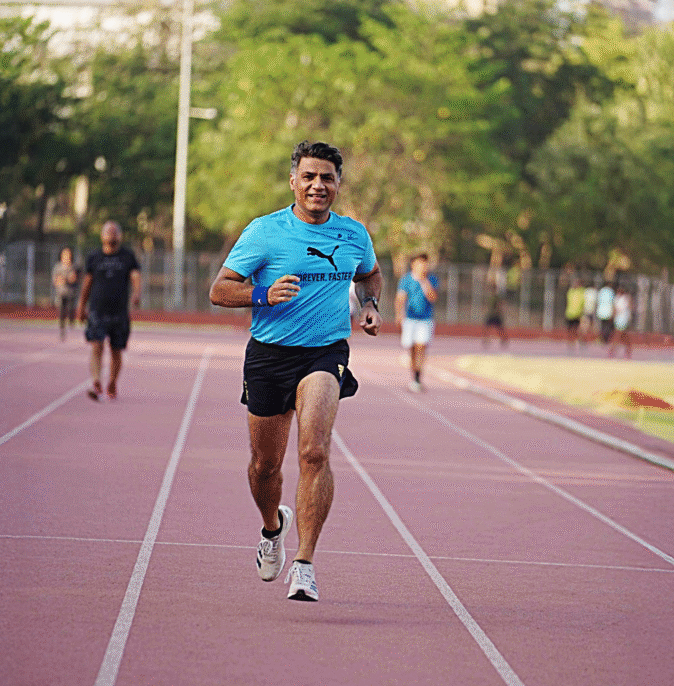Race Ready, Heart Ready: The Runner’s Guide to Preventive Cardiac Screening
Whether you’re a seasoned runner stepping up your distance or a newcomer chasing your first finish line, your heart health plays a key role. This article, authored by Dr. Ramit Wadhwa, a consultant in non invasive cardiology, an ultramarathoner and a passionate advocate for heart health, is part of our mission to help you race smart, not just hard. At RunPlayGo, we believe racing smart is just as important as racing hard, and your heart deserves the very best preparation and protection possible.

Why Preventive Heart Screening Matters
Endurance running challenges every part of your body, but it puts a special demand on your heart. For most runners, miles bring fitness, confidence, and joy. But sometimes, hidden cardiac conditions can turn training or racing into a serious risk – often with no warning signs. That’s why preventive cardiac screening is an essential step for every endurance athlete. Think of it as a health checkpoint that ensures your heart can keep pace with your passion.
Who Should Get Screened?
- New runners starting high-intensity endurance programs
- Athletes aged 35+
- Anyone with a family history of sudden cardiac death or heart disease
- Runners with chest pain, fainting, palpitations, or unexplained breathlessness
- Athletes returning to training after viral illnesses like COVID-19
The Screening Trio Every Runner Should Know
1. ECG (Electrocardiogram)
What it is: A quick, painless test that records the electrical activity of your heart.
Why it matters:
- Detects abnormal rhythms, conduction problems, or hidden inherited conditions.
- Vital for runners over 35, new athletes, or anyone with a family history of heart disease.
- Helps identify arrhythmias or signs of a silent past heart attack.
Conditions where ECG is critical:
- Hypertrophic Cardiomyopathy (HCM): abnormal Q waves, T-wave inversions.
- Arrhythmogenic Right Ventricular Cardiomyopathy (ARVC): T-wave inversions in right leads.
- Long QT Syndrome / Brugada Syndrome: abnormal QT intervals or distinct ECG patterns.
- Atrial Fibrillation: irregular rhythm.
- Silent Myocardial Infarction: Q waves or conduction defects.
2. Echocardiogram (Echo)
What it is: An ultrasound scan that visualizes the heart’s structure and pumping function.
Why it matters:
- Detects thickened or weakened heart muscle, valve problems, or structural issues.
- Differentiates between athlete’s heart (a normal adaptation) and dangerous cardiomyopathies.
- Provides deeper insight if ECG shows abnormal results.
Conditions where Echo is essential:
- Hypertrophic Cardiomyopathy (HCM): evaluates wall thickness patterns.
- Dilated Cardiomyopathy: enlarged chambers, weak contraction (low EF).
- Valvular Heart Disease: stenosis or regurgitation.
- Congenital Coronary Anomalies: structural defects.
- Myocarditis: wall motion abnormalities, reduced function.
3. Stress Echocardiography
What it is: An ultrasound of the heart done before and after exercise (treadmill/bike).
Why it matters:
- Shows how the heart handles exertion stress, revealing issues invisible at rest.
- Detects blocked arteries or reduced blood flow (ischemia), a major risk for older athletes.
- Especially useful for runners returning after COVID-19, unexplained symptoms, or with coronary risk factors.
Athlete’s Heart vs. Heart Disease: How to Tell the Difference
Cardiac changes from training can mimic disease. That’s why expert interpretation is crucial.
Feature | Physiological (Athlete) | Pathological (Disease) |
Sinus bradycardia | Common, harmless | Severe slowing, pauses, symptoms |
QRS voltage (LVH) | Symmetrical, benign | With Q waves / ST-T changes |
Early repolarization | Common in young/Black athletes | Brugada-like, abnormal patterns |
First-degree AV block | Mild, resolves with exercise | Severe, symptomatic |
T-wave inversion | Rare, V1–V4 in youth | Extensive, lateral/inferior leads |
ST depression | Absent | Present (esp. under stress) |
LV wall thickness | <13mm, regresses with detraining | ≥15mm, no regression (HCM) |
LV cavity size | Enlarged but normal EF | Enlarged with reduced EF |
Atrial size | Mild, no arrhythmia | Marked, with arrhythmia |
Regional wall motion | Normal | Abnormal (ischemia or MI) |
At RunPlayGo, we believe every runner deserves to cross the finish line strong and safe.
EKG screening might seem like an extra step, but it can truly be a lifesaver. With more amateur runners entering endurance events, taking a proactive approach to your cardiovascular health is essential. An EKG can help detect underlying heart issues that might otherwise go unnoticed, giving you the chance to address them early. Consulting a sports cardiologist ensures you fully understand your heart health and training limits. By knowing your data, you can prepare smarter, train safely, and build confidence for race day. Remember, your marathon doesn’t start at the starting line—it begins with preparation. Give your heart the head start it deserves, so you can run with strength, peace of mind, and true joy.

